
-
Find the right food for your petTake this quiz to see which food may be the best for your furry friend.Find the right food for your petTake this quiz to see which food may be the best for your furry friend.Health CategoryFeatured products
 Hill's Science Diet Adult Healthy Mobility Large Breed Chicken Meal, Barley & Brown Rice Recipe Dog Food
Hill's Science Diet Adult Healthy Mobility Large Breed Chicken Meal, Barley & Brown Rice Recipe Dog FoodAdvanced nutrition shown to support joint health and improve mobility
Shop Now Adult Perfect Digestion Chicken, Barley & Whole Oats Recipe Dog Food
Adult Perfect Digestion Chicken, Barley & Whole Oats Recipe Dog FoodScience Diet's breakthrough nutrition supports ultimate digestive well-being & healthy microbiome
Shop Now Adult Perfect Weight & Joint Support Chicken & Brown Rice Recipe Dog Food
Adult Perfect Weight & Joint Support Chicken & Brown Rice Recipe Dog FoodThis weight management and mobility support dog food was created with Hill’s unique understanding of the biology of overweight dogs.
Shop NowFeatured products Adult Perfect Digestion Chicken, Barley & Whole Oats Recipe Cat Food
Adult Perfect Digestion Chicken, Barley & Whole Oats Recipe Cat FoodHill's Science Diet's breakthrough nutrition supports ultimate digestive well-being & healthy microbiome
Shop Now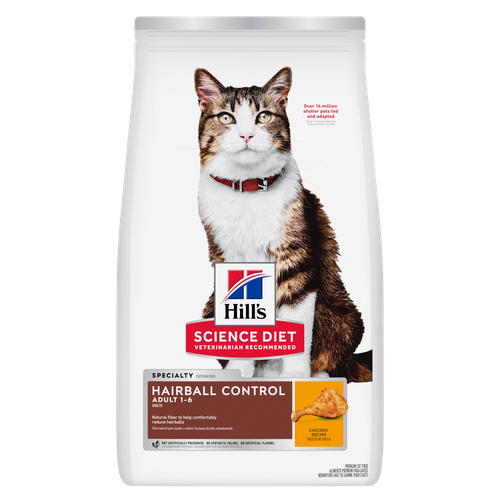 Adult Hairball Control Chicken Recipe Cat Food
Adult Hairball Control Chicken Recipe Cat FoodNatural fibre comfortably reduces hairballs
Shop Now Adult Healthy Cuisine Roasted Chicken & Rice Medley Cat Food
Adult Healthy Cuisine Roasted Chicken & Rice Medley Cat FoodDelicious roasted chicken and rice in a mouthwatering sauce
Shop Now -
DogCat
- Cat Tips & Articles
-
Health Category
- Weight
- Skin & Food Sensitivities
- Urinary
- Digestive
- Kidney
- Dental
- Serious Illness
-
Life Stage
- Kitten Nutrition
- Adult Nutrition
Featured articles Water
WaterWater is the most important nutrient of all and essential for life. Animals can lose almost all their fat and half their protein and still survive, but if they lose 15% of their water, it will mean death.
Read More Fun Ideas for Kids and Pets This Summer
Fun Ideas for Kids and Pets This SummerOutdoor summer activities with your dog or cat can be fun for kids, too. Learn how they also teach kids responsibility & creates a bond with their pet.
Read More Tips on How to Store Your Dog or Cat Food Properly
Tips on How to Store Your Dog or Cat Food ProperlyWhere you store your cat and dog food can make a big difference in the quality and freshness once it is opened. Here are some common questions and recommendations for optimal storage for all of Hill’s dry and canned cat and dog food.
Read More -


It can be hard to know whether or not your cat is too skinny. Roughly 60 percent of cats in the U.S. are overweight, according to the Association for Pet Obesity Prevention, so cats of a normal weight may seem abnormally thin to their pet parents. It can also be hard to tell whether your cat is skinny if they have long hair or a sagging belly (common among spayed and neutered cats).
While a skinny cat isn't necessarily a cause for an emergency trip to the veterinarian, if you find yourself searching "How to put weight on a cat," then it's probably time for further investigation.
Is My Cat Too Skinny?
Knowing whether your cat is too skinny can be challenging. 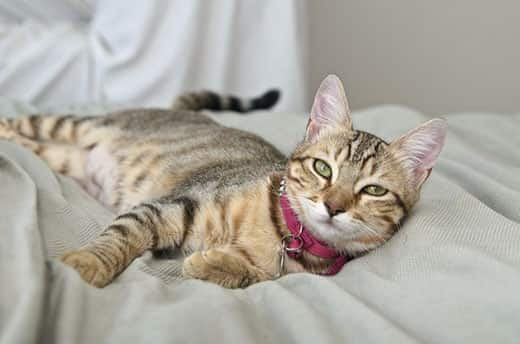 Fortunately, there are two easy tools you can use to determine if your cat is too thin, overweight or just right.
Fortunately, there are two easy tools you can use to determine if your cat is too thin, overweight or just right.
- The Body Condition Score: Vets use the body condition score (comparable to body mass index for humans) to evaluate a pet's weight. A body condition score chart can help you determine if your cat is too skinny. You can either find a chart online, from organizations like the American Animal Hospital Association, or at your vet's office.
- The Hand Test: You can also use your hand as a reference to determine your cat's body condition. Feel your cat's ribs (located behind their front legs); if they feel like the back of your hand, then their weight is just right. If they're ribs look or feel like your knuckles, then you have a skinny cat. If the ribs feel like your palm, then they're likely overweight. Still not sure? Check out this video from dvm360 that demonstrates the hand test.


Tasty Tips
Causes of Weight Loss in a Skinny Cat
There are two main causes for a skinny cat: Either they aren't eating enough, or they're expending more calories than they are taking in. They may not be eating enough due to stress, dental disease and/or nausea or a host of other reasons. Cats with certain diseases need to take in more calories in order to maintain their weight, and weight loss can be the first, and sometimes the only, outward sign that an underlying disorder has developed. Nausea can compound the problem. Weight loss can also be due to age-related decline in digestive function — some geriatric kitties (older than 10 years of age) have a hard time keeping on weight.
The other reason that a cat might be too skinny is a lack of access to food. If you find a stray cat that is malnourished, you can contact your local shelter or veterinarian to get their opinion on what to do to bring the cat back to a state of health. They may direct you to bring them in if possible. Adopted stray cats should always be taken to the veterinarian and screen for health problems.
While a skinny cat doesn't necessarily mean a medical emergency, if you think your cat might be too thin, it's important to schedule a checkup with your veterinarian to determine the cause of weight loss.
Weight loss can also be subtle and slow in onset. Recent research has shown that weight loss is a very early sign of kidney disease and may start manifesting itself three years earlier than other signs. Early intervention provides the opportunity to begin life-extending therapies earlier. Therefore, regular checkups with your veterinarian that include body weight can be very helpful in the early detection of the disease.
It is considered a medical emergency if your cat (skinny or not) stops eating altogether. If that's the case, you should take your cat to the vet right away. Cats that don't eat for days on end can develop a life-threatening condition called hepatic lipidosis, also known as fatty liver syndrome.
How to Put Weight on a Cat
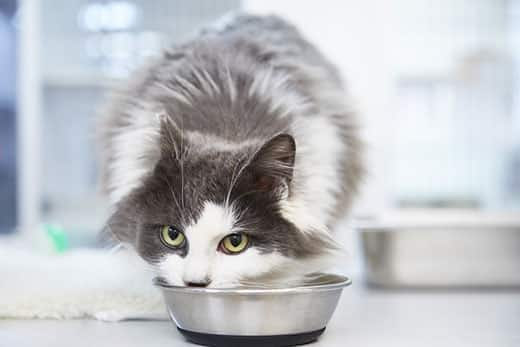 If you think your kitty needs to gain weight, you should first bring them to the veterinarian so that underlying medical conditions can be ruled out.
If you think your kitty needs to gain weight, you should first bring them to the veterinarian so that underlying medical conditions can be ruled out.
- Most cats simply need more meals per day and/or free access to dry food in order to gain weight. Cats prefer to 'graze' or eat small meals throughout the day so having food available all day long can make all the difference. Be sure to check with your vet to see if this would be a good option for your cat.
- If you have more than one cat, one might be guarding the food, preventing another from eating their fill. Make sure that all cats have access to food throughout the day in a safe, non-threatening environment.
- If your cat is nervous, make sure the food bowl is not near an object that is scaring them such as a cycling furnace, air conditioner, noisy pipe, or barking dog.
- If you feed your cat dry kibble, offer them canned food (or vice versa) in addition to dry.
- If you tend to dress up their food with toppers, mixing it, and fussing over them. Try offering simple meals straight out of the bag or can in a quiet place without a lot of fuss.
- For cats that are truly finicky, try different flavors and consistencies of both dry and wet food — some cats prefer chicken pate, others salmon stew — but make sure to properly transition their food to avoid any digestive upset.
- Heat their food in the microwave for 10 seconds to enhance its aroma. Make sure to use an appropriate microwavable container when doing so.
- Shred a very small amount of rotisserie chicken into their food; most cats love the smell and flavor of roasted chicken. Just be sure to only feed her skinless white meat. Remember you cat's daily meal should be mainly a well-balanced cat food.
- Try adding a very small amount of the liquid from canned tuna or unsalted chicken broth to your cat's food.
Some cats may simply need a higher calorie food and could benefit from a supplemental, high-calorie, canned therapeutic food. Older cats struggling to keep on weight may benefit from a highly digestible food rich in antioxidants, omega-3 and -6 fatty acids and prebiotics.
Always check with your veterinarian before changing your cat's food or giving them nutritional supplements. A pet weight loss program should always be overseen by a veterinarian.
If you think your kitty might be too skinny, consulting their vet is always the best course of action. They can help you come up with strategies to get your cat to eat more and can determine if there are any serious issues underlying the weight loss. Hopefully, with a little patience and veterinary input, you'll have your fluff ball back to a healthy weight in no time.


Dr. Sarah Wooten graduated from UC Davis School of Veterinary Medicine in 2002. A member of the American Society of Veterinary Journalists, Dr. Wooten divides her professional time between small animal practice in Greeley, Colorado, public speaking on associate issues, leadership, and client communication, and writing. She enjoys camping with her family, skiing, SCUBA, and participating in triathlons.
Related products

Hill's Science Diet's breakthrough nutrition supports ultimate digestive well-being & healthy microbiome

Delicious roasted chicken and rice in a mouthwatering sauce

Natural fibre comfortably reduces hairballs

Healthy digestion for easy litter box clean-up
Related articles
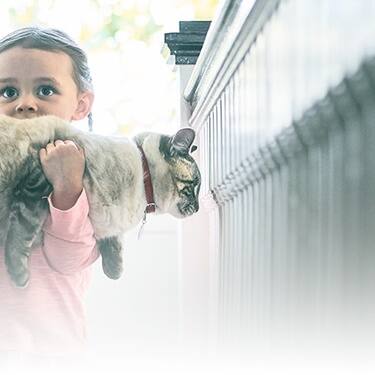
Provide the best possible treatment for cats with sensitive skin by spotting the signs, knowing the causes, and understanding the remedies. Learn more now.
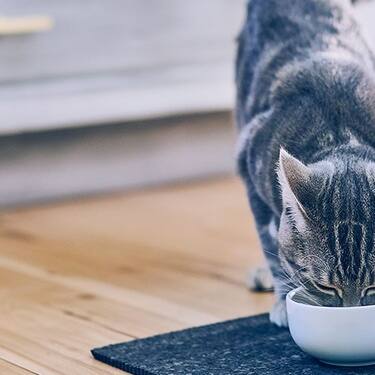
Understand the symptoms of a chronic upset stomach in your cat, and learn how to help sooth their discomfort.
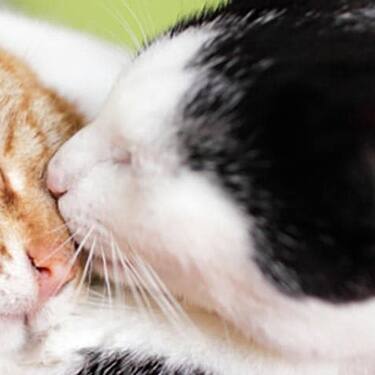
Being overweight puts a cat at risk for developing many serious health issues. Weight gain indicates an increase in body fat and usually results when your cat eats too much and exercises too little.
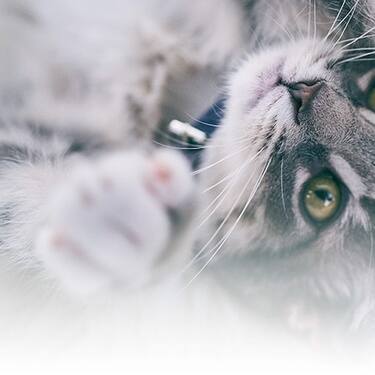
Obesity affects more than 30 percent of cats in America. Learn how you can properly feed and exercise your cat to improve its weight management.

Put your cat on a diet without them knowing
Our low calorie formula helps you control your cat's weight. It's packed with high-quality protein for building lean muscles, and made with purposeful ingredients for a flavorful, nutritious meal. Clinically proven antioxidants, Vitamin C+E, help promote a healthy immune system.
Put your cat on a diet without them knowing
Our low calorie formula helps you control your cat's weight. It's packed with high-quality protein for building lean muscles, and made with purposeful ingredients for a flavorful, nutritious meal. Clinically proven antioxidants, Vitamin C+E, help promote a healthy immune system.

